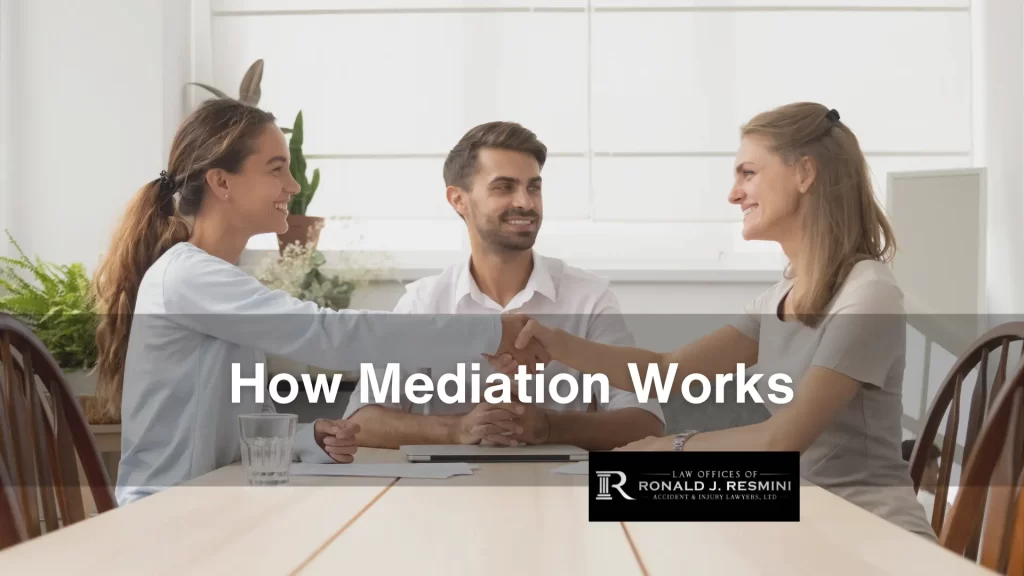 Mediation is the process of settling a dispute with the guidance of an impartial third party. The parties can willingly engage in mediation or receive a court order to do so. Although court-ordered mediation is less frequent in personal injury cases, it can occur after filing the case but before the trial. Many attorneys and judges like mediation because it allows the parties to openly discuss their case with the guidance of a disinterested third party while saving time and money.
Mediation is the process of settling a dispute with the guidance of an impartial third party. The parties can willingly engage in mediation or receive a court order to do so. Although court-ordered mediation is less frequent in personal injury cases, it can occur after filing the case but before the trial. Many attorneys and judges like mediation because it allows the parties to openly discuss their case with the guidance of a disinterested third party while saving time and money.
Related Post: When Mediation is NOT a Good Idea
The Mediator
A mediator is a neutral third party who reviews the facts of the case and guides discussions about settlement. In Rhode Island, certified mediators are required to have one of the following:
- At least 30 hours of mediation training
- Have at least two years of professional experience as a mediator
- Appointment as a mediator by a judicial or governmental body
Mediators will help the parties focus on the relevant facts so they don’t get bogged down debating issues that won’t impact the settlement. They may also ask questions to show the strengths and weaknesses of each party’s case.
Additionally, a mediator can propose potential resolutions for the parties to consider. However, mediators are not decision-makers. Therefore, they cannot make final determinations regarding your case.
Mediation Confidentiality
The purpose of mediation is to allow for an open and honest conversation so that the parties can resolve their dispute. The parties will sign a confidentiality agreement before the mediation session begins. As a result, information shared during mediation is confidential unless the parties waive their confidentiality or if it falls into one of the few exceptions, such as:
- Threats of violence
- Admission of abuse
- Information about the furtherance of a crime
Anything the parties involved say during mediation cannot be used against them in a lawsuit. For example, the defendant’s settlement offer cannot be utilized to demonstrate guilt or that they believe the plaintiff deserves compensation. This is referred to as mediation confidentiality.
Preparing for Mediation
You should prepare for mediation to improve your chances of it being successful. To prepare for mediation, you should do the following:
- Determine what is important to you in the dispute, such as the minimum compensation you are willing to accept.
- Gather and understand the information and records relevant to your case’s potential resolution.
- Discuss the mediation process and your attorney’s opening statement so that you have a better understanding of what to expect during mediation.
In addition to preparing for mediation, you do not want to enter mediation with a predetermined mindset. The success of mediation will depend on the parties being willing to compromise. An experienced attorney will help improve your chances of a successful mediation by preparing you for it.
Mediation Process
Mediation begins with introductions of each party and the mediator. Then each party’s attorney will make their opening statements. During opening statements, the lawyer for each party will present their case and discuss relevant evidence. After opening statements, the mediator usually moves the parties to separate rooms. The mediator will then move from party to party to help them negotiate a settlement.
During the negotiation stage of mediation, the mediator’s job is to communicate each party’s position and settlement offers to the other side. They will also suggest ways to resolve the case and occasionally converse privately with the attorneys to discuss the strengths and weaknesses of the case, facilitating the attainment of a settlement.
When mediating a settlement, you need to write down the terms. The settlement agreement is not binding until all parties sign the agreement. If someone has a change of heart after mediation before the settlement agreement is signed, the case may still need to go to trial.
What Happens if Mediation Doesn’t Work?
 Unfortunately, there is no guarantee that you will come out of mediation with a settlement agreement. If you cannot reach a mutual resolution for your case during mediation, you must prepare to go to trial. However, if mediation fails to result in a settlement, it does not preclude the possibility of negotiating a settlement agreement before the trial. The only time limit on reaching a settlement agreement is that no settlement can be made after a judge or jury determines a verdict at trial.
Unfortunately, there is no guarantee that you will come out of mediation with a settlement agreement. If you cannot reach a mutual resolution for your case during mediation, you must prepare to go to trial. However, if mediation fails to result in a settlement, it does not preclude the possibility of negotiating a settlement agreement before the trial. The only time limit on reaching a settlement agreement is that no settlement can be made after a judge or jury determines a verdict at trial.
Once a judge or jury reviews the case and makes a decision, the decision becomes final. As a result, sometimes, parties who fail to reach an agreement at mediation choose to settle before the verdict to avoid the uncertainty of the potential judgment.
Read more: Is Mediation Legally Binding
Contact a Personal Injury Attorney Today
If you were injured in an accident because of someone else’s negligence, the experienced attorneys at The Law Offices of Ronald J. Resmini, Accident & Injury Lawyers, Ltd. could help you throughout your personal injury case, including during the mediation process. Our attorneys have the skill and knowledge to prepare you for and represent you during mediation, and throughout your case. We specialize in getting results.
Contact us today to discuss your legal options during a free case evaluation. You can reach us at (401) 444-4444.
